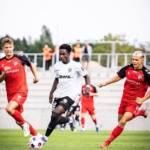
They told us the Ghanaian was patient, accommodating, almost too forgiving. People who could laugh at their pain, crack jokes at their own funerals, and still find the strength to dance barefoot in the dust. But that Ghanaian belongs to yesterday’s archives. Today, a new Ghanaian is walking into the dawn.
This new Ghanaian is not carved from the old scripts of obedience. He is restless, she is defiant, they are unafraid. They have seen their parents betrayed by promises, their grandparents robbed of dignity by corruption, and their future mortgaged to incompetence. They are no longer willing to wait politely in queues for water that never comes, or for justice that arrives too late.
The new Ghanaian is wired. A child of smartphones, Twitter hashtags, TikTok rants, and Facebook Lives. Their protest is not only in the streets but also in the feeds, where power is mocked in real time, and lies are archived for accountability. They can quote the Constitution in one breath and drop a viral punchline in the next. They are not waiting for politicians to lead; they are writing their own scripts of leadership, one podcast, one petition, one startup at a time.
The new Ghanaian mayor, when he rises, may not be a creature of partisanship. For him or her, the national interest overrides party interest. Their loyalty is not to elephant or umbrella but to the people who walk barefoot to fetch water, the market woman who hustles to pay school fees, the driver trapped in potholes that have become swimming pools. They understand that governance is not a party trophy but a civic duty.
And yet, in every home, there is a Mensah. For as much as a new Ghanaian is emerging, there are still fragments of the old Ghanaian, those who “stood aside and looked.” The pawns. The ones who always know somebody who knows somebody in a certain party, and who will defend partisan colors over national interest. They clog the arteries of progress with excuses and slogans, willing to barter the nation’s soul for proximity to power.
But make no mistake, the new Ghanaian is not without scars. Beneath the bravado lies a deep disillusionment. They know the state can fail them, that police uniforms can shelter criminals, that courts can dance to political drums, and that elections can feel like auctions of deceit. Their cynicism is earned, not inherited. And yet, they dare to believe. They dare to dream.
The new Ghanaian is both rebel and builder. Rebel against mediocrity, builder of alternatives. You will find them coding fintech apps in cramped rooms with unstable Wi-Fi, or teaching village kids under mango trees when government classrooms collapse. You will see them crowdfunding surgeries, auditing politicians, planting trees, or creating music that refuses to bow.
This Ghanaian is not perfect. Sometimes their anger is raw, their satire cruel, their impatience reckless. But perfection is not the point. Renewal is. In the same soil where despair once grew, a new energy is sprouting, untamed, unfiltered, and undeniable.
And so, to those in power: beware. To those who still dream: take courage. To those who doubt: just look around. A new Ghanaian has emerged, not asking for permission, not waiting for applause, not afraid of consequence. This is the Ghanaian who will not merely endure, but redefine what it means to be free, to be equal, to be sovereign.
The next chapter of Ghana will not be written by the timid. It will be written by this Ghanaian.
As the elders say, “Se wo werɛ fi na wosankɔfa a, yenkyi,” when you forget and return to pick up what is useful, it is no disgrace. The new Ghanaian knows this truth: we must carry the wisdom of the past, but we must never again carry its chains.
The only question left is this: are you a new Ghanaian, or an old one?



